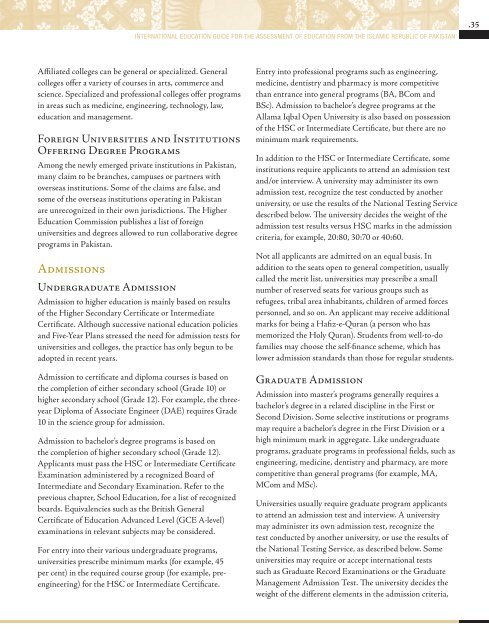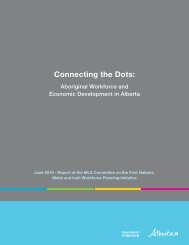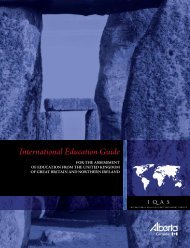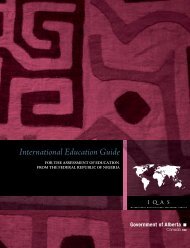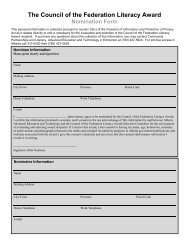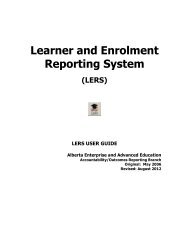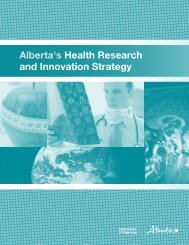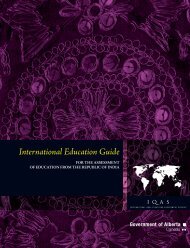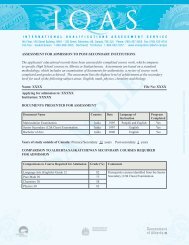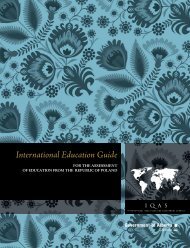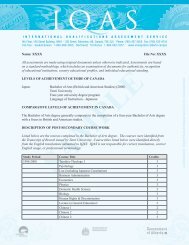International Education Guide - Enterprise and Advanced Education ...
International Education Guide - Enterprise and Advanced Education ...
International Education Guide - Enterprise and Advanced Education ...
You also want an ePaper? Increase the reach of your titles
YUMPU automatically turns print PDFs into web optimized ePapers that Google loves.
INTERNATIONAL EDUCATION GUIDE for the assessment of education from the Islamic Republic of Pakistan<br />
.35<br />
Affiliated colleges can be general or specialized. General<br />
colleges offer a variety of courses in arts, commerce <strong>and</strong><br />
science. Specialized <strong>and</strong> professional colleges offer programs<br />
in areas such as medicine, engineering, technology, law,<br />
education <strong>and</strong> management.<br />
Foreign Universities <strong>and</strong> Institutions<br />
Offering Degree Programs<br />
Among the newly emerged private institutions in Pakistan,<br />
many claim to be branches, campuses or partners with<br />
overseas institutions. Some of the claims are false, <strong>and</strong><br />
some of the overseas institutions operating in Pakistan<br />
are unrecognized in their own jurisdictions. The Higher<br />
<strong>Education</strong> Commission publishes a list of foreign<br />
universities <strong>and</strong> degrees allowed to run collaborative degree<br />
programs in Pakistan.<br />
Admissions<br />
Undergraduate Admission<br />
Admission to higher education is mainly based on results<br />
of the Higher Secondary Certificate or Intermediate<br />
Certificate. Although successive national education policies<br />
<strong>and</strong> Five-Year Plans stressed the need for admission tests for<br />
universities <strong>and</strong> colleges, the practice has only begun to be<br />
adopted in recent years.<br />
Admission to certificate <strong>and</strong> diploma courses is based on<br />
the completion of either secondary school (Grade 10) or<br />
higher secondary school (Grade 12). For example, the threeyear<br />
Diploma of Associate Engineer (DAE) requires Grade<br />
10 in the science group for admission.<br />
Admission to bachelor’s degree programs is based on<br />
the completion of higher secondary school (Grade 12).<br />
Applicants must pass the HSC or Intermediate Certificate<br />
Examination administered by a recognized Board of<br />
Intermediate <strong>and</strong> Secondary Examination. Refer to the<br />
previous chapter, School <strong>Education</strong>, for a list of recognized<br />
boards. Equivalencies such as the British General<br />
Certificate of <strong>Education</strong> <strong>Advanced</strong> Level (GCE A-level)<br />
examinations in relevant subjects may be considered.<br />
For entry into their various undergraduate programs,<br />
universities prescribe minimum marks (for example, 45<br />
per cent) in the required course group (for example, preengineering)<br />
for the HSC or Intermediate Certificate.<br />
Entry into professional programs such as engineering,<br />
medicine, dentistry <strong>and</strong> pharmacy is more competitive<br />
than entrance into general programs (BA, BCom <strong>and</strong><br />
BSc). Admission to bachelor’s degree programs at the<br />
Allama Iqbal Open University is also based on possession<br />
of the HSC or Intermediate Certificate, but there are no<br />
minimum mark requirements.<br />
In addition to the HSC or Intermediate Certificate, some<br />
institutions require applicants to attend an admission test<br />
<strong>and</strong>/or interview. A university may administer its own<br />
admission test, recognize the test conducted by another<br />
university, or use the results of the National Testing Service<br />
described below. The university decides the weight of the<br />
admission test results versus HSC marks in the admission<br />
criteria, for example, 20:80, 30:70 or 40:60.<br />
Not all applicants are admitted on an equal basis. In<br />
addition to the seats open to general competition, usually<br />
called the merit list, universities may prescribe a small<br />
number of reserved seats for various groups such as<br />
refugees, tribal area inhabitants, children of armed forces<br />
personnel, <strong>and</strong> so on. An applicant may receive additional<br />
marks for being a Hafiz-e-Quran (a person who has<br />
memorized the Holy Quran). Students from well-to-do<br />
families may choose the self-finance scheme, which has<br />
lower admission st<strong>and</strong>ards than those for regular students.<br />
Graduate Admission<br />
Admission into master’s programs generally requires a<br />
bachelor’s degree in a related discipline in the First or<br />
Second Division. Some selective institutions or programs<br />
may require a bachelor’s degree in the First Division or a<br />
high minimum mark in aggregate. Like undergraduate<br />
programs, graduate programs in professional fields, such as<br />
engineering, medicine, dentistry <strong>and</strong> pharmacy, are more<br />
competitive than general programs (for example, MA,<br />
MCom <strong>and</strong> MSc).<br />
Universities usually require graduate program applicants<br />
to attend an admission test <strong>and</strong> interview. A university<br />
may administer its own admission test, recognize the<br />
test conducted by another university, or use the results of<br />
the National Testing Service, as described below. Some<br />
universities may require or accept international tests<br />
such as Graduate Record Examinations or the Graduate<br />
Management Admission Test. The university decides the<br />
weight of the different elements in the admission criteria,


